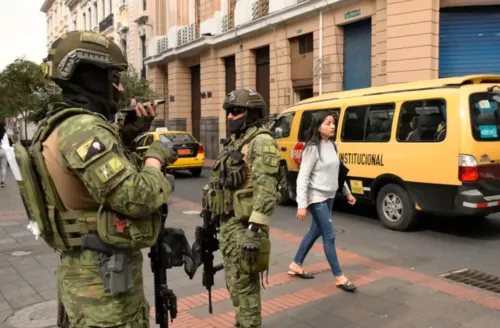
The diplomatic crisis caused by Ecuador after the invasion of the Mexican embassy in Quito, with the arrest of former Ecuadorian vice-president Jorge Glas, gave an international dimension to the policy that has been implemented in the country since the inauguration of Daniel Noboa in January this year.
Shortly after taking command of the country, Noboa declared a state of exception with the Armed Forces operating on the streets to confront the growing wave of violence in the country.
The measure, initially scheduled to last 60 days, was extended for the second time on Monday (8). The new decree presented by Noboa alleges the persistence of the conditions that gave rise to the “internal armed conflict” and updates “the rules for combating and neutralizing criminal and terrorist groups”.
For Ecuadorian sociologist Irene León, just three months after taking office, Daniel Noboa’s government provoked a “gigantic escalation of authoritarianism” and the arrest of Jorge Glas reveals that this escalation is directed at his political rivals from the Citizen Revolution Movement. They governed Ecuador from 2007 to 2017 under the presidency of Rafael Correa, of whom Glas was vice president.
“What is at stake is making it impossible for the citizen revolution process to return to the country and the kidnapping of Jorge Glas demonstrates this”, he told the Brazil in fact.
“At stake is the strengthening of the neoliberal project of this corporate capitalism that seeks to strengthen the interests of transnational corporations in the country. Noboa himself is one of the most important millionaire heirs in the country, whose agricultural export companies are registered in tax havens, therefore acting as foreign investment.”
During his vice-presidency, Glas led the strategy to change the production matrix in Ecuador, one of the economic transition proposals implemented by the Correa government.
During this period, León points out that Ecuadorian legislation allowed internal development in Ecuador, with the construction of its own infrastructure for energy sources, for example, which mainly affected transnational companies.
“It created other sources of resources, taking into account the economic and productive diversity registered in the Constitution of Ecuador so as not to be a country dependent exclusively on primary exports,” she said.
Noboa’s onslaught, she assesses, is aimed at dismantling the State and the Citizen Constitution, through a referendum scheduled for April 21st, which could change the guidelines of the Magna Carta approved in 2008.
“Ecuador’s Constitution is one of the most advanced in the world and has a lot of anti-systemic potential, which is why he is trying to dismantle it. This project of leaving the Ecuadorian Constitution to enter the axes of neoliberalism is also a central axis in international politics.”
In addition to defending corporate interests, León assesses that Ecuador’s international policy under the Noboa government is based on the strategic interests of the United States in the geopolitics of Latin America and the Caribbean. It is in this context, he emphasizes, that the invasion of Mexico’s diplomatic territory must be analyzed.
“There is a great banner called the fight against drug trafficking and terrorism, in which these corporate interests and the strengthening of neoliberalism and American geostrategic interests intervene. It is necessary to read what happens in the relationship between Ecuador and Mexico with this key as well .”
The invasion of the Mexican embassy, points out Léon, breaks the possibility of Ecuador continuing in the Latin American integration project, in particular with the agreement on Latin America as a Zone of Peace, one of the central declarations of the Community of Latin American States and Caribbean (Celac). Mexico played a central role in the resumption of Celac as an important space for integration between countries amid cycles of conservative governments in the region.
“Ecuador made a violent gesture of hostile non-compliance towards a sister country, a very important country for the integration process. All integration initiatives were hit hard by the conservative restoration, but Mexico took this initiative and Celac recovered .”
Editing: Rodrigo Durão Coelho

Source: www.brasildefato.com.br

